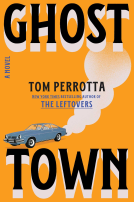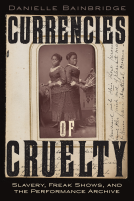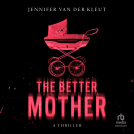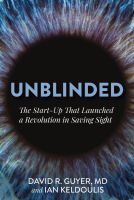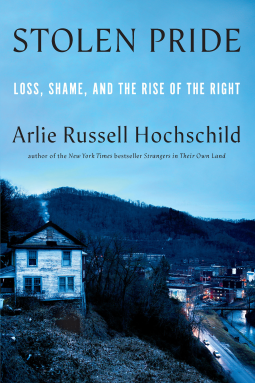
Stolen Pride
Loss, Shame, and the Rise of the Right
by Arlie Russell Hochschild
This title was previously available on NetGalley and is now archived.
Send NetGalley books directly to your Kindle or Kindle app
1
To read on a Kindle or Kindle app, please add kindle@netgalley.com as an approved email address to receive files in your Amazon account. Click here for step-by-step instructions.
2
Also find your Kindle email address within your Amazon account, and enter it here.
Pub Date Sep 10 2024 | Archive Date Sep 09 2024
Talking about this book? Use #StolenPride #NetGalley. More hashtag tips!
Description
In her first book since the widely acclaimed Strangers in Their Own Land, the National Book Award finalist and bestselling author Arlie Russell Hochschild now ventures to Appalachia, uncovering the “pride paradox” that has given the right’s appeals such resonance
“Arlie Russell Hochschild’s work has never been more timely or more necessary, from the resurgence of interest in emotional labor to [her] deep, empathetic dive into the heart of the Right.”—Sarah Jaffe, author of Necessary Trouble: Americans in Revolt, on Strangers in Their Own Land
For all the efforts to understand the state of American politics and the blue/red divide, we’ve ignored what economic and cultural loss can do to pride. In Stolen Pride, Arlie Russell Hochschild argues that Donald Trump has turned lost pride into stolen pride and shame into blame, and that the result of his rhetorical alchemy has been to weaponize that shame and introduce a potent blend of anger and often violent rhetoric—undermining democracy and highlighting revenge.
Hochschild’s research drew her to Pikeville, Kentucky, in the heart of Appalachia, within the whitest and second-poorest congressional district in the nation, where its residents faced the perfect storm. The city was reeling: coal jobs had left, crushing poverty arrived, and a deadly drug crisis struck the region more powerfully than anywhere else in the nation. Although Pikeville had been in the political center thirty years ago, by 2016, 80 percent of the district’s population voted for Donald Trump. Hochschild’s brilliant exploration of how the town responded in 2017, when a white nationalist march came to town—a rehearsal for the deadly Unite the Right march that would take place in Charlottesville, Virginia, just four months later—takes us deep inside a community that defies stereotypes.
In Stolen Pride, Hochschild—whose previous book, Strangers in Their Own Land, was heralded by the New York Times as one of a small handful of books to read to understand Trump and the 2016 election—focuses on a group at the center of the shifting political landscape: blue-collar men. Long conversations over six years with mayors and felons, clerks and shopkeepers, road workers and teachers, ex-coal miners, and recovering addicts form the core of the book, movingly introducing readers to real people living deep within the political storm.
Hochschild’s great gift is to decode the emotional narratives that demagogues can speak to and lay bare the pain that lies beneath the rage. And in some of the voices she listens to, Hochschild hears an alternative to the inchoate anger, as she and her subjects imagine a way we might build bridges and move forward.
ABOUT THE AUTHOR
Arlie Russell Hochschild is the author of many groundbreaking books, including The Second Shift, The Managed Heart, and The Time Bind as well as Strangers in Their Own Land, which became an instant bestseller and was a finalist for a National Book Award, and Stolen Pride: Loss, Shame, and the Rise of the Right (both from The New Press). Hochschild is professor emerita of sociology at the University of California, Berkeley. She lives in Berkeley with her husband, the writer Adam Hochschild.
Advance Praise
“What a superb book! If progressives are ever to regain the trust of downwardly mobile white voters powerfully drawn to Trump and the far right, we need to listen deeply to Arlie Hochschild.”
—Robert Kuttner, co-editor of the American Prospect and author of Going Big
“Arlie Russell Hochschild’s Stolen Pride is a masterpiece of epic proportions. Her account of a small, struggling Appalachian community’s response to a parade of out-of-state white nationalists provides a glimmer of hope for our fragile democracy, even in the face of political polarization, economic inequality, racism, and the nonrational, emotional dimensions of political identity and mobilization. My advice to everyone is: read this book.”
—Shaunna L. Scott, associate professor emerita of sociology, University of Kentucky, and former president of the Appalachian Studies Association
“In Stolen Pride, Arlie Russell Hochschild continues her cutting-edge research into forgotten Americans, people who desperately need help but cling to the myth that anyone can make it in America through hard work. Hochschild’s insights are compassionate, illuminating, and deeply moving.”
—Robert B. Reich, former secretary of labor and professor emeritus, University of California at Berkeley
“In Stolen Pride, the inimitable Arlie Russell Hochschild once again sheds light on an often-overlooked segment of Americans, providing a deeply human exploration of the rituals and emotions that sustain a proud region in precarious times.”
—Jennifer Silva, author of We’re Still Here: Pain and Politics in the Heart of America
“As with Hochschild’s classic Strangers in Their Own Land, Stolen Pride has a truth and intimacy that delivers to the grateful reader what is rare in today’s political studies: true human understanding. Stolen Pride is a superb book, and in these times, an essential read.”
—Mark Danner, author of Stripping Bare the Body and Spiral: Trapped in the Forever War
“Arlie Hochschild reveals what liberals miss—that the moral emotions of pride and shame animate the resentment that roils our politics. This is the best book yet on the moral and political psychology of the new right, a masterclass in the art of listening across our cultural and political divides.”
—Michael J. Sandel, author of The Tyranny of Merit: Can We Find the Common Good?
Available Editions
| EDITION | Hardcover |
| ISBN | 9781620976463 |
| PRICE | $30.99 (USD) |
| PAGES | 400 |
Available on NetGalley
Average rating from 14 members
Featured Reviews
 Media/Journalist 144784
Media/Journalist 144784
The author, whose last book was a finalist for the National Book Award turns her lens to Appalachia to examine what she calls the “pride paradox,” or shame into blame that leads to blue/red state division, anger and, sometimes, the violence that threaten democracy.
Hochschild focuses on Pikeville, Kentucky, a small town of about seven thousand in eastern Kentucky fairly close to the West Virginia border. It is in the country’s whitest and second poorest Congressional district. Historically it has been largely reliant on coal jobs which are, for the most part, gone and there is a major opioid problem in the area; by 2016 80% of KY-5 supported candidate Donald Trump.
Thirty-six percent of KY-5 is covered by Medicaid, which the Republicans generally disapprove of and generally attempt to limit. For all of Kentucky, 38% of its budget comes from the federal government. Oh, and 70% of white men without a bachelor’s degree support Donald Trump.
As for the author’s “pride paradox,” it’s that people in red states are generally worse off (see that 70% mentioned above.). However, it’s those same people who, when surveyed, tend to feel that if they are not successful they, the individual person, is responsible for that lack of success….it’s not due to societal factors, etc. (of course, this is, in part, due to racial factors.). Hence the paradox, they are doing badly but also feel badly about it. So they are looking for someone to blame. And boy, does Donald help them with that!
Of course, in the words of one well off resident of the area, “urban liberals don’t even think about it but they’re the pride news. To them, coal miners with dirty faces, off and on poverty, lung disease, we’re the shame news.” OK, to be fair, do those sound like things to be prideful about? There are lots of great things about Appalachia and the people who live there, but those things aren’t among them. Those sound like words from someone who sounds like he has a giant chip on his shoulder. And I’m from and live in Appalachia.
There are really two distinct sections to the book; in the first the author uses the framework of a 2019 White Nationalist march in Pikeville to get a read on the populace, and in the second, a lead up to the 2020 election.
As to the march the whitest area of the country largely defies stereotypes. Matthew Heimbach, the man who would go on to orchestrate Charlottesville, organized the Pikeville march, hoping for lots of publicity and new recruits and got….a lot of disinterest. There are a number of interesting interviews with Heimbach.
The pre-election information is a bit more varied. Yes, there is the guy who believes Democrats are drinking blood. Most is a bit more nuanced, but the basics are the same, and a lot of misunderstandings seem to come from the fact that many people get all their news and information from within the same right-wing bubble that brought us untruths like the idea that the election was stolen, which just isn’t so.
Some residents of Pikeville spoke of a “Democratic” war on coal. Trump promised to bring coal jobs back but the area actually LOST more coal jobs under Trump than it did under the Obama terms. Just numbers people. Facts. Coal is a dying industry. Just a fact. No one can save it.
Another fallacy, Biden and gas prices. This wasn’t Biden…didn’t anyone notice that oil companies made record profits in the past few years? Record profits. And, just for laughs, because both parties need corporate donors, but which party is FAR more apt to provide corporate tax breaks? Republicans.
And then, as to Trump himself, “what to many seemed like disqualifying character flaws - selfishness, narcissism, vengefulness, cruelty - ‘when he’s running for us, that’s to our advantage,’” So, the author notes, kids in school are learning far different rules for character than we look for in our President.
Good book. The people who need it won’t read it, except for, hopefully, everyone in Pikeville and the surrounding area. Maybe it will change some minds there. I will never understand people voting against their own self interest who also can’t argue they aren’t doing it for the greater good of society. One way of solving the pride paradox would be to be proud to stand against “selfishness, narcissism, vengefulness and cruelty.” They aren’t what we should seek in our leaders and are what we must stand vigilant against in ourselves.
Readers who liked this book also liked:
Danielle Bainbridge
Arts & Photography, Multicultural Interest, Nonfiction (Adult)
Dr. David Guyer & Ian Keldoulis
Business, Leadership, Finance, Health, Mind & Body, Science
